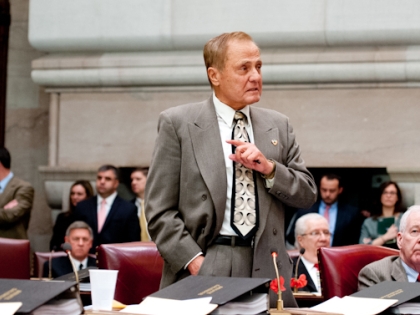
Bonacic: the Senate Passes Governor’s Ethics Bill
John J. Bonacic
June 14, 2011
-
ISSUE:
- Ethics
State Senator John J. Bonacic (R/C/I – Mt. Hope), today stated that the Senate passed the ethics reform legislation announced by Governor Andrew Cuomo, Senate Majority Leader Dean Skelos, and Assembly Speaker Sheldon Silver.
The historic legislation, is called the “Public Integrity Reform Act of 2011”, which is sponsored by Senate Majority Leader Dean G. Skelos, represents a three-way agreement with the Assembly and Governor Andrew Cuomo.
“Passing the Governor’s Ethics Bill is one of a variety of steps being taken to restore the public’s trust in New York State government. While ethics reform is essential; it is one step in a continuing process to make government function more efficiently. Earlier in the year, we passed an on-time budget which eliminated a $10 billion deficit and cut spending without raising taxes. We also reached a conceptual agreement to cap property taxes, an issue that Senate Republicans have championed for years; and I am focused on and eager to get this done. I am confident that we will pass legislation to give certainty to taxpayers and businesses, so they finally get the property tax relief they deserve,” said Senator Bonacic.
The terms of the ethic agreement include:
Greater Financial Disclosure: Financial disclosure statements filed with the new Joint Commission on Public Ethics from elected officials will now be posted on the internet and the practice of redacting the monetary values and amounts reported by the filer will be ended.
Increased Access to Who is Appearing Before the State and Why: The Act establishes a new database of any individual or firm that appears in a representative capacity before any state governmental entity.
Additional Disclosures for Registered Lobbyists: The bill expands lobbying disclosure requirements, including the disclosure by lobbyists of any "reportable business relationships" of more than $1,000 with public officials. It also expands the definition of lobbying to include advocacy to affect the "introduction" of legislation or resolutions, a change that will help to ensure that all relevant lobbying activities are regulated by the new Joint Commission.
Forfeiture of Pensions for Public Officials Convicted of a Felony: Certain public officials who commit crimes related to their public offices may have their pensions reduced or forfeited in a new civil forfeiture proceeding brought by the Attorney General or the prosecutor who handled the conviction of the official.
A New Joint Commission on Public Ethics: The Joint Commission on Public Ethics will replace the existing Commission on Public Integrity with jurisdiction over all elected state officials and their employees, both executive and legislative, as well as lobbyists. The bipartisan Joint Commission will consist of 14 members:
· Six appointed by the Governor and Lieutenant Governor, at least three of whom shall be enrolled members of the major political party that is not that of the Governor
· Eight appointed by the legislative leaders (four each from the two major political parties)
Among other restrictions, no individual will be eligible to serve on the Joint Commission who has within the last three years been a registered lobbyist, a statewide office holder, a legislator, a state commissioner or a political party chairman.
The Joint Commission will have jurisdiction to investigate potential violations of law by legislators and legislative employees and, if violations are found, issue findings to the Legislative Ethics Commission, which will have jurisdiction to impose penalties.
###
Share this Article or Press Release
Newsroom
Go to NewsroomSenator Bonacic speaks at the NYSCOPBA Rally
May 1, 2017



